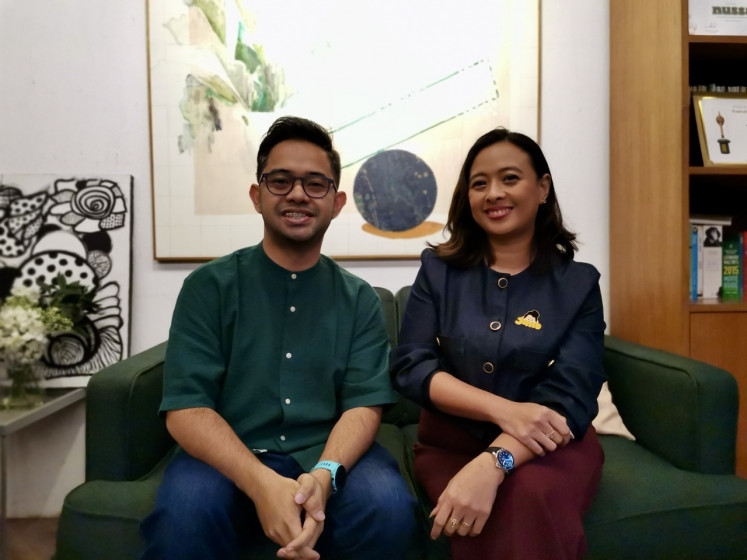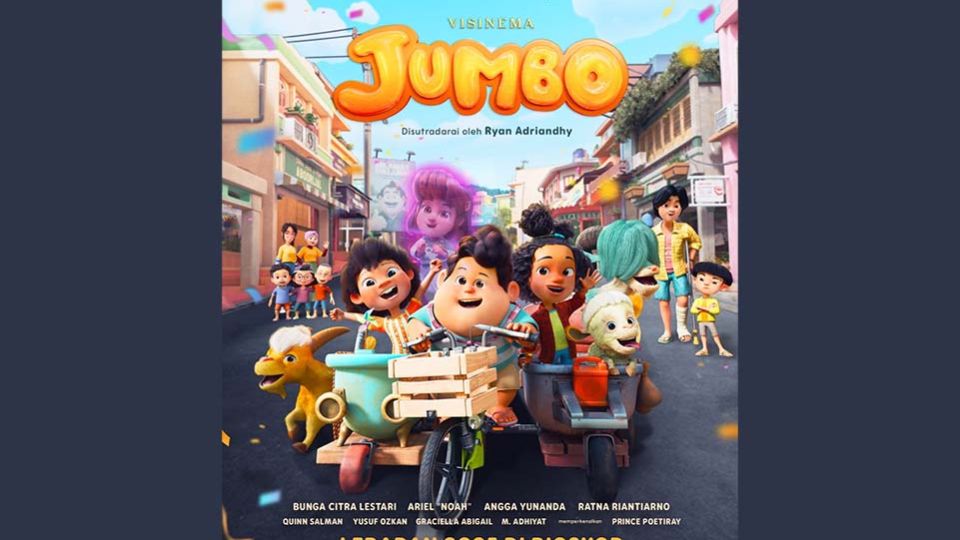April 28, 2025
JAKARTA – At this point, Jumbo is everywhere. The film has been dominating Indonesian theaters since the Idul Fitri holiday. Its soundtrack has been a regular on the airwaves and on streaming platforms. Images from the film have even become ubiquitous at Soekarno-Hatta International Airport as Jumbo posters greet practically everyone flowing through the airport.
After quite a hectic couple of weeks, The Jakarta Post was finally able to have a sit-down with director and writer Ryan Adriandhy and producer Anggia Kharisma. Now that their success has been realized, they can finally summarize the meaning behind the magic of Jumbo.
“It’s an open door,” Anggia said. “Little steps that have opened a door.”
Connecting with ‘Generation Alpha’
Jumbo took more than five years to arrive on the Indonesian silver screen and, unavoidably, the world has changed quite dramatically since the turn of the decade.
Contemporary cinephiles, including children, have been exposed to a wide variety of animation filmmaking, from the compact aesthetics of the Lego Movie franchise to the more watercolor aesthetics of the Oscar-winning Flow. Furthermore, as evidenced by abundant live-action adaptations of classic Disney features, it is no longer the case that vivid storytelling requires the animation form.
Nonetheless, Anggia has always believed that the story of Jumbo is best delivered as an animated feature.
“The story [of Jumbo] is more about reflection and redemption,” she went on to describe. “Furthermore, it reminds us that we can ‘hug’ so many emotions in such a gentle manner. Ultimately, we believe that animation is the best medium.”
Whether the animation form can still excite contemporary cinephiles, Ryan, with no sugarcoating, remarked, “It feels like the industry has barely scratched the surface of what animation can actually do, including how to present a narrative. Story-wise, we could still dig even deeper. I think that we can’t dismiss it and say, ‘Well, I’ve seen this before!’ because [animation] is a stylistic choice. It depends on its story, characters as well as the world we want to present.”
But then, there’s the “kids” factor. Ryan wittily reflected that “even adults used to be kids”. That being said, modern adults might not necessarily be able to connect with modern children, Generation alpha, who grew up with the likes of Bluey and Attack on Titan.
Anggia, discerningly, observed the portrait of modern children as both a challenge and an opportunity: “What actually needs to be fixed is our nervous system so that we can befriend them [Generation alpha], enter their world, and understand their mindset.
“We [adults] have our point of view, but so do they. And this should propel us to have a discussion with our inner child. Above all else, that’s why my tentacle of curiosity is still dancing to this day.”
Cinema-pop symbiosis
Jumbo, written by Ryan alongside Widya Arifianti, tells the story of its titular character, whose journey unfolds as he encounters a spirit in need of help. The voice-over cast consists of, to name a few, Prince Poetiray, Quinn Salman, Yusuf Ozkan, Graciella Abigail, M. Adhiyat and Kiki Narendra.
For Ryan, the animated feature also serves to showcase his skills as a rising director. One of his goals during the production phase was to ensure he could orchestrate all the “textual and subtextual” elements within Jumbo seamlessly without raising eyebrows from his audience.
Directing Jumbo was a balancing act, but when all is said and done, the directorial key here is to trust the process.

The celebrated Indonesian animated feature film Jumbo was directed and co-written by Ryan Adriandhy (left), and co-produced by Anggia Kharisma (right). PHOTO: THE JAKARTA POST
Ryan divulged, “it’s the process that allowed me the space to embrace input, namely from producers and even character designers.”
Anggia and her fellow producers, meanwhile, were keen on taking another big swing for Jumbo by recruiting pop artists to compose the film’s pop-oriented soundtrack. In terms of music, according to Anggia, they deliberately avoided typical showtunes. She also believes that, when done right, a pop song vocally delivered by children can feel more emotionally urgent.
“We chose pop music because we want everyone to listen to it not by using their head, but their heart,” she explained. “That’s how the lyrics can be illuminated. The melodies, then, create a sort of personal attachment with the listeners, which could lead to divergent interpretations.”
Sweet victory
The impact of Jumbo, so far, has been cross-systemic.
Not only has the animated feature broken box-office records, domestically and internationally, but it has also catapulted children’s songs to mainstream status. The song “Selalu Ada di Nadimu” performed by Prince Poetiray and Quinn Salman, in particular, has enjoyed a rapid rise on the music streaming charts.
Looking at this impact, Ryan and Anggia acknowledged an abundance of support from various parties that they have received along the way. That being said, they do not wish for the public and their fellow filmmakers to draw the wrong conclusion from this success.
For example, they believe that a story should always precede support.
“What can embrace people is a story that matters,” Anggia highlighted. “Watching a film is a private experience. That means you could have a different interpretation of the story. Jumbo doesn’t merely entertain. It does not preach its message either. More than those things, Jumbo reveals the heart’s deepest layer.”
Ryan, meanwhile, hopes his fellow filmmakers will not immediately assume that animated features mean an instant-success scheme.
“Story and characters are still the heart,” he asserted. “And for [potential] backers and producers, they shouldn’t forget to invest in people, including their growth as well as process.”
Currently, Visinema Studios is ready to introduce Jumbo to an even wider international market. Even though the film was developed with Indonesian children in mind, Anggia believes that Jumbo, nonetheless, delivers “universal truths” for children of different nationalities. The sky’s the limit for Jumbo and Visinema Studios, and Ryan and Anggia are cautiously optimistic in finding out what is to come.
But ultimately, for Ryan, the sweetest victory is how Jumbo proves that, for Indonesian children everywhere, being an animator is no longer a pipe dream.
“When I was 4 years old, I watched The Lion King and I knew that being an animator was a distant dream,” he looked back. “But I wanted to fight for it. I made a promise [to myself].”


